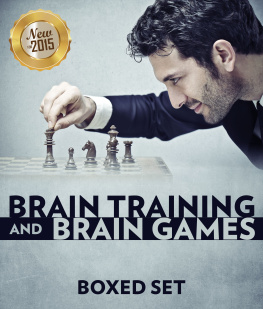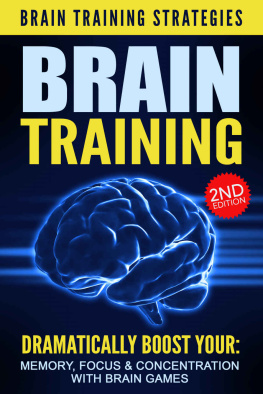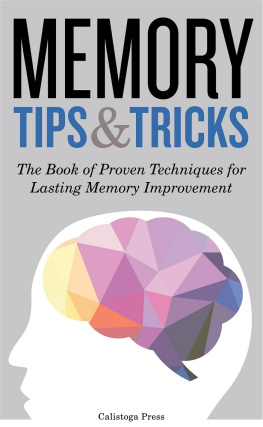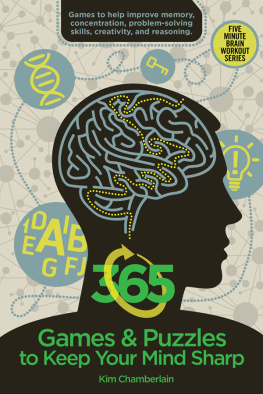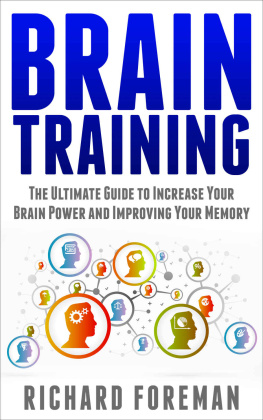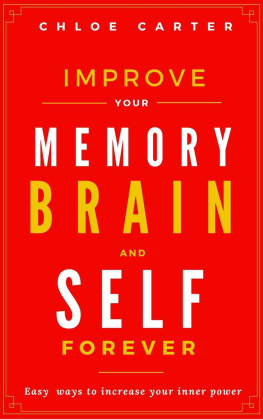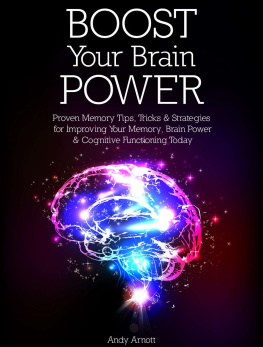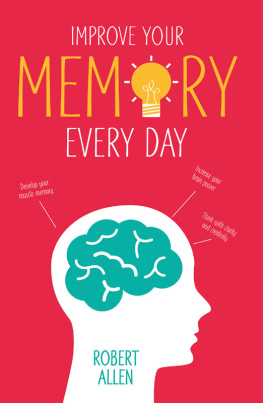Burbelo - Brain Games for Everyone: How to Increase Your Brain Power in Short Term with Memory Games for All Ages
Here you can read online Burbelo - Brain Games for Everyone: How to Increase Your Brain Power in Short Term with Memory Games for All Ages full text of the book (entire story) in english for free. Download pdf and epub, get meaning, cover and reviews about this ebook. year: 2015, genre: Children. Description of the work, (preface) as well as reviews are available. Best literature library LitArk.com created for fans of good reading and offers a wide selection of genres:
Romance novel
Science fiction
Adventure
Detective
Science
History
Home and family
Prose
Art
Politics
Computer
Non-fiction
Religion
Business
Children
Humor
Choose a favorite category and find really read worthwhile books. Enjoy immersion in the world of imagination, feel the emotions of the characters or learn something new for yourself, make an fascinating discovery.

Brain Games for Everyone: How to Increase Your Brain Power in Short Term with Memory Games for All Ages: summary, description and annotation
We offer to read an annotation, description, summary or preface (depends on what the author of the book "Brain Games for Everyone: How to Increase Your Brain Power in Short Term with Memory Games for All Ages" wrote himself). If you haven't found the necessary information about the book — write in the comments, we will try to find it.
Burbelo: author's other books
Who wrote Brain Games for Everyone: How to Increase Your Brain Power in Short Term with Memory Games for All Ages? Find out the surname, the name of the author of the book and a list of all author's works by series.
Brain Games for Everyone: How to Increase Your Brain Power in Short Term with Memory Games for All Ages — read online for free the complete book (whole text) full work
Below is the text of the book, divided by pages. System saving the place of the last page read, allows you to conveniently read the book "Brain Games for Everyone: How to Increase Your Brain Power in Short Term with Memory Games for All Ages" online for free, without having to search again every time where you left off. Put a bookmark, and you can go to the page where you finished reading at any time.
Font size:
Interval:
Bookmark:
Brain Games for Everyone
How to Increase Your Brain Power in Short Term with Memory Games for All Ages
Table of Contents
Thank you for downloading this book, Brain games for everyone. It is not an ordinary ebook telling you what your brain is, how, when and why to improve it only. It is a whole set of extensive information rather, collected from various authentic sources for your brain empowerment and well-being. Its major focus is on improving your memory and making you an alert, intelligent and mindful human being. Because our brain is our strength and power and losing it means loosening of all sorts of power or strengths. Therefore, this ebook not only helps you to sort out ways about improving your memory through different means but also gives you extensive information about how things work in your brain.
This ebook is a must for all those who like to improve their mental health as all of us do need an equal opportunity to get proper brain training. This ebook fulfils that need.
In short, this book is equally helpful for all individuals: children, youngsters and adults.
I wish you very good luck!
With Love,
Author
Memory is your capability of storing, encoding, recalling and retaining information or experiences from the past in your brain.
From names of different people to formal numbers, addresses and long digital structures, our brain has to hold a rather endless reservoir of information. How can we recall, reproduce, restore and read all this information without any difficulty? During learning a new thing, brain cells undergo from several structural and chemical changes. Information transforms into memory through altering the strength or number of relations between different brain cells. Scientists are digging down more about the connection of brain and memory and their working since long. They are also interested in finding out ways to boost storage and memory formation and disorders and reasons of memory loose.
You know the very first step in the memory creation process is Memory Encoding. It is basically a biological process with all roots in our senses, and it starts with perception. Take the example of a persons memory, you were deeply involved with? When you met them first, your brain registered were the memories of their physical features such as their height, skin color, eyes and so on. This was done by your visual system while your auditory system recalls the way they spoke or how they laughed and your sense of smell might also have noticed their perfume etc.
Each of these senses moved toward a special part of brain called Hippocampus. These perceptions are integrated here and made them one.
Hippocampus along with another part of the brain is known as the Frontal Cortex. This portion analyzes all inputs and decides which one among them is worth to remember; those worth-remembering goes to the long-term memory portion.
Despite the fact that memory-making process begins with perception (external), it includes chemical processing and electrical language. In it, nerve cells meet with other cells at Synapse (all brain actions occur here); electrical pulses transfer messages across the gaps of these cells. This transformation and or electric firing release especial messengers called neurotransmitters . These transmitters fill the gaps between these cells by sticking with them. This enables each cell to make 1000 types of links like that. (An average human brain can form 100 trillion synapses in this manner). Electric impulses are received in a particular portion of the brain called Dendrites. These are feathery slants that can go to neighboring brain cells easily.
The connections or relations of these cells are changing all the time, so are not concrete. They work like a network and arrange themselves by forming groups. The synapse becomes stronger when a cell sends message to another. Therefore, more signals mean more powerful connection. And with every single experience, new physical wiring is done in the brain and its organization and arrangement is totally dependent on how you utilize it. This flexibility (scientific term is plasticity) is a blessing for human beings because it helps it in rearrangement of the brain cells, if ever they are smashed up.
So, more experience means more coding and new memories occur. Another thing that is worth-mentioning here is more concentration and attention empowers memory encoding. It is not possible for a human being to concentrate on all things, all the time, so the routine things are all filtered out; while a few things only passes in your conscious knowledge. Scientists say that if you begin noticing every single detail, your memory would be overloaded before your arrival at the office in the morning.
Memory loss is the biggest trouble that most of us face due to many reasons for instance stroke, head injury, stress, sleeplessness, aging and so on. However, there could be other problems that affect a human memory or working of the brain such as some people are not very good at memorizing things for no apparent reason, some students cannot recall lessons that they just prepared last night, some people start forgetting things easily, though physically perfect and mentally stable etc. We shall not go into these details as there is a lot of information already spread about them. But things worth-considering here are looking for solutions to these problems. Moreover, healthy human beings should also try improving their memory.

There is no doubt about the importance of your brain. It stands as a nub for your whole body and the commanding headquarters for it. Every single action you do, from thinking to speaking and from eating to resting are largely dependent upon your brains good working condition. Damage or disaster to any region of your brain highly affects the working of it. Without a brainwe do not even exist!
I think, therefore I am. Ren Descartes, 17th-century philosopher
Unless your memory fail or become a source of big troubles in life or at work, you take it for granted. You want to improve it but never bother it. You are satisfied, okay. But you may also think that there is nothing you can do about it. Wrong. You can do a lot and in many interesting ways that we are going to explore in the upcoming chapters. But the question is why it is so important for us all?
- It is your memory that generates good or bad feelings, for instance, when you recall a past tragedy, you become sad but if you recall a good experience, a smile on your face starts appearing.
- Competency and strong brain power is shown by having a strong memory. You become less liable to pitfalls while having a good memory.
- We can save our experiences and recall them anything etc.
- A good memory can get you good grades at school or a good performance report at the office.
- A good memory makes you intelligent.
- For competitions and mental games, a good memory is required before anything else
Hence, there are many arguments that clear the importance of having a good memory but I have discussed only a few due to the shortage of time.
The following chapters unveil different things that can be done for boosting your memory. It involves food items, games and exercises along with quick medical information about memory improvement medicines and other fun tips.
Font size:
Interval:
Bookmark:
Similar books «Brain Games for Everyone: How to Increase Your Brain Power in Short Term with Memory Games for All Ages»
Look at similar books to Brain Games for Everyone: How to Increase Your Brain Power in Short Term with Memory Games for All Ages. We have selected literature similar in name and meaning in the hope of providing readers with more options to find new, interesting, not yet read works.
Discussion, reviews of the book Brain Games for Everyone: How to Increase Your Brain Power in Short Term with Memory Games for All Ages and just readers' own opinions. Leave your comments, write what you think about the work, its meaning or the main characters. Specify what exactly you liked and what you didn't like, and why you think so.

